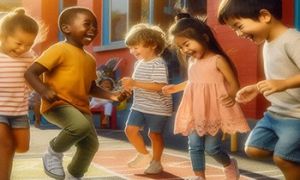

MYTH: You have to attend work meetings after hours for free. FACT: You should be paid. MYTH: You need to pay for training. FACT: You are paid for those hours. Your employer must pay you for all hours you work and any compulsory time spent for work, including meetings and training.
Nature programs in early childhood settings are a fantastic way to connect children with the natural world and promote holistic development. The following article provides information on Key Aspects Of Nature Programs, Benefits of Nature Programs, How To Start A Nature Program, Nature Programs and The EYLF, Nature Activity Ideas and more.
Connecting with local Aboriginal and Torres Strait Islander (ATSI) communities can be a rewarding and enriching experience. The following article provides information on Steps To Seek Support and Build Relationships With ATSI Communities, Ensuring Involvement Is Respectful To ATSI Communities, How To Seek Permission To Use Or Share ATSI Stories Or Materials, Seeking Permission In NSW, Getting Involved With Local ATSI Organisations and more.
Embedding Aboriginal and Torres Strait Islander (ATSI) perspectives and pedagogies in Early Years education environments is essential for several reasons. The following article provides infromation on the Importance Of Embedding ATSI Perspectives And Pedagogies In The Early Years Education Environments, Incorporating ATSI Perspectives Into Your Practice, Incorporating ATSI Histories and Cultures in EYLF Curriculum, Examples Of Effective Activities, EYLF and ATSI Perspectives and more.
The Australian 24-Hour Movement Guidelines for the Early Years provide comprehensive recommendations for physical activity, sedentary behavior, and sleep for children from birth to 5 years. The following article provides information About The Australian 24-Hour Movement Guidelines for the Early Years, Key Recommendations, and more.
Children's drawing isn't just a pastime—it plays a crucial role in their development and learning. The following article provides information on Why Drawing Is Essential For Children, Activities That Can Promote Drawing Skills In Children, Age-appropriate Drawing Activities For Toddlers, How Drawing Helps Children Express Their Emotions, Activities That Can Help Children Express Emotions Through Drawing and more.
Incorporating cultural texts into nursery rhymes is a fantastic way to celebrate diversity and introduce children to different cultures. The following article provides information on The Importance To Incorporate Cultural Text Into Nursery Rhymes, Steps To Incorporate Cultural Texts, Example Adaptions, and more.
The value of play in early childhood cannot be overstated, as it is essential for a child's overall development and well-being. The following article provides information on Why Play Is So Valuable, What Is Play?, Why Is Play Important For Children's Development, Educator's Role In Play, Styles Of Play, What Happens When Children Don't Play, How To Encourage Children To Play, Play Theories, Linking Play To The EYLF and more.
 Here is the list of the EYLF Learning Outcomes that you can use as a guide or reference for your documentation and planning. The EYLF… Read More
Here is the list of the EYLF Learning Outcomes that you can use as a guide or reference for your documentation and planning. The EYLF… Read More
 The EYLF is a guide which consists of Principles, Practices and 5 main Learning Outcomes along with each of their sub outcomes, based on identity,… Read More
The EYLF is a guide which consists of Principles, Practices and 5 main Learning Outcomes along with each of their sub outcomes, based on identity,… Read More
 This is a guide on How to Write a Learning Story. It provides information on What Is A Learning Story, Writing A Learning Story, Sample… Read More
This is a guide on How to Write a Learning Story. It provides information on What Is A Learning Story, Writing A Learning Story, Sample… Read More
 One of the most important types of documentation methods that educators needs to be familiar with are “observations”. Observations are crucial for all early childhood… Read More
One of the most important types of documentation methods that educators needs to be familiar with are “observations”. Observations are crucial for all early childhood… Read More
 To support children achieve learning outcomes from the EYLF Framework, the following list gives educators examples of how to promote children's learning in each individual… Read More
To support children achieve learning outcomes from the EYLF Framework, the following list gives educators examples of how to promote children's learning in each individual… Read More
 Reflective practice is learning from everyday situations and issues and concerns that arise which form part of our daily routine while working in an early… Read More
Reflective practice is learning from everyday situations and issues and concerns that arise which form part of our daily routine while working in an early… Read More
 Within Australia, Programming and Planning is reflected and supported by the Early Years Learning Framework. Educators within early childhood settings, use the EYLF to guide… Read More
Within Australia, Programming and Planning is reflected and supported by the Early Years Learning Framework. Educators within early childhood settings, use the EYLF to guide… Read More
 When observing children, it's important that we use a range of different observation methods from running records, learning stories to photographs and work samples. Using… Read More
When observing children, it's important that we use a range of different observation methods from running records, learning stories to photographs and work samples. Using… Read More
 This is a guide for educators on what to observe under each sub learning outcome from the EYLF Framework, when a child is engaged in… Read More
This is a guide for educators on what to observe under each sub learning outcome from the EYLF Framework, when a child is engaged in… Read More
 The Early Years Learning Framework describes the curriculum as “all the interactions, experiences, activities, routines and events, planned and unplanned, that occur in an environment… Read More
The Early Years Learning Framework describes the curriculum as “all the interactions, experiences, activities, routines and events, planned and unplanned, that occur in an environment… Read More

Easter is coming closer to us. So, to continue the tradition of dyeing Easter eggs...
See more...
Play is more than just fun—it’s an essential part of a child’s growth and development...
See more...
EYLF Learning Outcome 3 focuses on "Children Have A Strong Sense Of Wellbeing." The following...
See more...© 2009-2025 Aussie Childcare Network Pty Ltd. All Rights Reserved.
